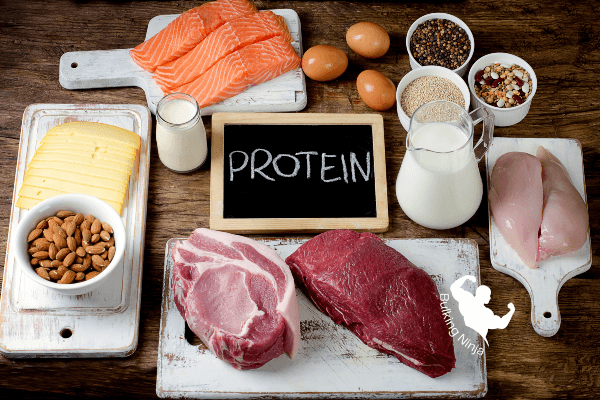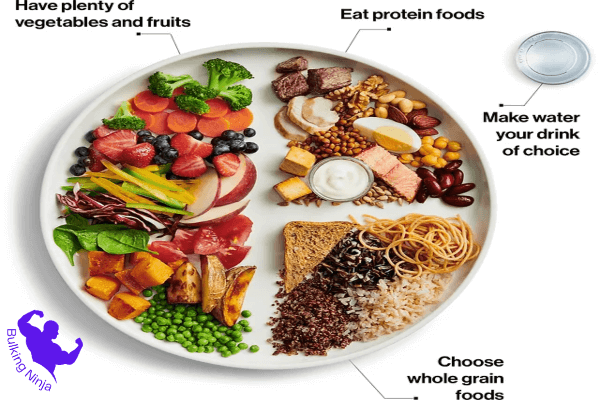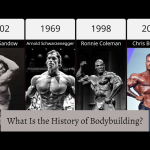Achieving muscle growth is a primary goal for many fitness enthusiasts, but the journey to bulging biceps and a chiseled physique is often riddled with frustration. Despite the consistent grind at the gym, some individuals find themselves questioning, “Why are my muscles not growing after working out?” This perplexing concern is not uncommon and can be attributed to various factors that extend beyond just lifting weights.
From inadequate nutrition and improper workout techniques to overtraining and inadequate recovery, understanding the intricate dynamics of muscle growth is crucial for anyone seeking to optimize their fitness regimen.
In this comprehensive blog post, we’ll delve into the science behind muscle development and explore the potential reasons behind the stalled progress, offering practical insights and strategies to overcome these hurdles and kick-start the muscle growth journey.
Table of Contents
Why are My Muscles Not Growing after Working Out?

In the quest for muscle growth, understanding the intricate balance between various elements is key. Weight training and a well-crafted diet plan are your foundational pillars. To see your muscles flourish, it’s essential to focus not only on the numbers but also on the quality of your workouts. Lean muscle growth becomes attainable when you fine-tune your workout routine, incorporating the right changes.
Say goodbye to excess fat by implementing the tips and tricks that transform your workout into a fat-burning machine. Your nutrition plan should reflect your daily needs, ensuring that your dietary choices support your muscle-building goals. It may seem tricky, but remember that exhaustion is not always a sign of progress.
In fact, it can lead to the point where muscle growth stalls. Sharing your progress and learning from others can be invaluable in this journey. In this exploration of “why are my muscles not growing after working out,” we will uncover the secrets to overcoming these hurdles and propelling yourself towards your fitness goals with confidence.
You’re Not Eating Enough Protein

Understanding the intricate process of muscle growth goes beyond just lifting weights; it involves nourishing your body with the right fuel. The building blocks of muscle development, amino acids, are derived from protein, making protein intake an indispensable aspect of your fitness journey.
For many, diets often fall short in providing an adequate amount of this essential macronutrient, leaving our muscle-building potential untapped. Athletes and fitness enthusiasts should be aware that the recommendations for protein intake are higher, especially for those striving to build muscle.
Post-workout nutrition plays a pivotal role in this equation, and incorporating a variety of proteins into your diet can significantly impact the growth of muscles. Natural food sources like eggs, Greek yogurt, lean meats, and nutrient-rich seeds such as chia and flax are excellent choices to fuel your body. While supplements can be convenient, they should complement a well-balanced diet.
It’s important to stimulate muscle growth by addressing protein deficiency, promoting adequate consumption, and adhering to these health maintenance recommendations. With the right approach, your fitness journey can be a transformative experience, and your muscles will thank you for it.
Ensure an ample intake of a diverse range of proteins within your post-workout nutrition.
Incorporate options like
Eggs,
Greek yogurt,
Lean meats,
Chia and flax seeds, and
Whey protein isolate to optimize your muscle recovery and growth.
You’re not lifting heavy enough

In the pursuit of muscle growth, understanding the mechanisms at the cellular level is crucial. Lifting weights and engaging in resistance training are pivotal for stimulating muscle hypertrophy, the process through which muscle tissue enlarges. Incorporating pyramid training into your workout routine can be a game-changer, as it allows for progressive overload by alternating between lighter and heavier weights.
This approach not only promotes muscle gain but also encourages the body to adapt and thrive under varying levels of resistance. With each workout, focus on achieving the ideal number of reps, gradually challenging yourself to lift heavier weights as your strength and endurance improve.
Consistent training, combined with strategic adjustments in weight and repetitions, can significantly contribute to overcoming the challenges of muscle stagnation. By comprehensively integrating these techniques, you can pave the way for sustainable muscle growth and realize your fitness aspirations with confidence.
You’re not allowing enough recovery between sets
Achieving significant muscle growth requires a strategic approach to resistance training. It is vital to allow your muscles ample time to recover between sets to maximize their capacity and facilitate efficient muscle building. Overtraining can hinder progress, so it’s crucial to strike a balance between pushing your limits and giving your body the necessary time to recuperate.
By performing exercises with proper form and taking brief breaks between sets, you can effectively stimulate muscle fibers and promote a robust physique that is both enviable and enduring. Keep in mind that building muscle is a gradual process that demands patience and consistency.
With the right blend of dedication, recovery, and efficient training, you can pave the way for impressive gains and a well-sculpted physique that reflects your hard work and commitment.
You’re training inconsistently
- Consistency in your workout routine is key to fostering muscle growth and achieving your fitness goals.
- The process of developing a well-defined physique and robust skeletal muscle tissue requires dedication and regular training.
- Setting realistic goals and planning a structured exercise regimen can significantly contribute to the efficient progress of your fitness journey.
- Cultivating good exercise habits and maintaining consistency not only improves your stamina but also keeps you motivated to strive for greater results.
- It’s essential to understand that muscle growth is a gradual process that cannot be achieved overnight, emphasizing the significance of patience and perseverance in your fitness endeavors.
- Building up your strength and endurance through consistent training can lead to a more efficient and effective workout, enabling you to hit the gym with purpose and determination.
You’re training wrong
We need Understanding the Role of Various Factors in Muscle Growth
- Personal Trainer and Consistent Training
Working with a knowledgeable personal trainer can offer valuable insights into optimizing your workout regimen. Consistent training under their guidance can significantly impact muscle growth, ensuring you’re on the right track to achieve your fitness goals. - Reps, Weights, and Endurance
Striking the right balance between the number of repetitions and the weights you lift is crucial for fostering muscle development. Ideally, aiming for a moderate number of repetitions can enhance both strength and endurance, contributing to a well-rounded workout routine. - Caloric Intake and Muscle Building
Recognizing the importance of caloric intake in the context of muscle building is vital. Ensuring a small surplus in your calorie consumption, rather than operating at a deficit, can fuel your workouts and provide the necessary energy for effective muscle growth. - Rest Days and Impact on Muscle Growth
The significance of rest days in the muscle-building process cannot be overlooked. Allowing ample time for rest and recovery is essential for maximizing the impact of your workouts, preventing overexertion, and promoting efficient muscle repair and growth. - Strategic Approach and Optimal Results
By understanding the role of each factor, including proper rep range, adequate calorie intake, and strategic rest periods, you can create an effective plan that works in synergy to propel your muscle growth journey forward. Making informed decisions and adhering to a well-structured fitness regimen can yield positive and sustainable results in the pursuit of muscle development.
You’re doing too much cardio
In the pursuit of a well-defined physique and increased muscle mass, maintaining a carefully structured workout regimen is crucial. While focusing on calorie intake and mindful eating habits, it’s imperative to strike a balance between cardio sessions and targeted resistance training.
By incorporating the right type of cardio exercises into your routine, you can effectively manage body fat levels while prioritizing the development of lean muscle mass. Ensuring adequate recovery for each muscle group following intense workouts is vital to prevent overexertion and maximize the benefits of your training efforts.
Understanding the dynamics of muscle gain and body fat loss, and recognizing the importance of resistance training, can ultimately transform the seemingly impossible goal of building muscle mass into an achievable reality. With a well-structured regimen and strategic emphasis on recovery, you can unlock your body’s potential and witness significant progress in your muscle growth journey.
You’re gobbling down your food

- Understanding the Role of Nutrition
Recognize that your body’s ability to build lean muscle hinges on various factors, including your calorie intake and eating habits.
- Managing Caloric Intake
While consuming enough calories is vital for muscle building, it’s equally crucial to be mindful of the potential risks associated with a calorie surplus, as it could hinder your progress and lead to detrimental effects on your fitness journey.
- Eating Mindfully
Pay attention to your eating pace, allowing your body enough time to process hunger cues and avoid the trap of overeating.
- Optimizing Muscle Growth
Being mindful of your nutritional choices and maintaining a balanced approach to calorie consumption, you can create an environment conducive to effective muscle building over time.
You’re not drinking enough water
Ensuring your muscles have access to essential nutrients, such as protein and glycogen, is vital for muscle growth. To achieve this, staying well-hydrated is a top priority. Here’s a guideline to maintain hydration: aim for 16 cups or a gallon of water, which equates to approximately 50 mL or 1.7 fl. oz. per kilogram of body weight throughout the day.
To make this manageable, consider drinking two cups of water with each meal and snack. Additionally, a pro tip is to front-load your water intake earlier in the day to avoid nighttime disruptions. This strategy not only helps with muscle growth but also supports the nervous system, which plays a critical role in muscle control.
However, it’s crucial to be aware of the potential dehydrating effects of alcohol. Alcohol can suppress the central nervous system, compromise the immune system, and interfere with protein synthesis pathways, hindering muscle development. It’s wise to opt for healthier choices and minimize alcohol consumption when prioritizing muscle building.
Should you indulge in a few drinks, pay extra attention to your nutrition to counteract the damage caused by alcohol. With the right balance of hydration, nutrient intake, and mindful choices, you can significantly enhance your muscle growth potential and achieve your fitness goals more effectively.
You’re not eating enough carbohydrates
The role of carbohydrates in the diet is often a sticking point among fitness enthusiasts. While some may advocate for cutting carbs, it’s important to recognize that carbohydrates serve as a vital source of energy, particularly during high-intensity weightlifting sessions. Maintaining adequate energy levels is crucial for optimal athletic performance and ensuring that muscle cells have the necessary fuel to support repair and strength building.
Additionally, consulting a registered dietitian can be instrumental in ensuring that your dietary choices align with your fitness goals. Rather than viewing carb consumption as counterintuitive, understanding its role in providing essential energy for muscle growth can significantly contribute to your progress and overall well-being.
You’re not getting enough sleep
For those striving to enhance muscle growth, it is imperative to recognize the significant impact of a healthy diet, adequate rest, and quality sleep on overall fitness progress. While high-intensity training and focused attention on specific muscle groups are crucial, the role of sufficient shut-eye should not be underestimated.
During sleep, the body undergoes essential processes of recovery and repair, facilitated by the levels of human growth hormone. Conversely, elevated stress hormone levels, such as cortisol, directly linked to sleep deprivation, can impede muscle development. Hence, focusing on not only the quantity but also the quality of sleep is essential to avoid the detrimental effects of insufficient rest on muscle gain.
By prioritizing comprehensive lifestyle adjustments and promoting a holistic approach to wellness, individuals can effectively nurture muscle growth and achieve their fitness goals with greater ease and success.
Frequently Asked Questions
How do you force muscle growth?
To stimulate muscle growth, you should focus on progressive overload, ensuring you progressively increase weight, reps, or sets over time. Maintain a balanced diet with adequate protein, carbohydrates, and fats, and prioritize sufficient rest and recovery to allow your muscles to heal and grow.
Why are my muscles not growing?
Possible reasons might include inadequate protein intake, insufficient training intensity, lack of proper rest and recovery, or not varying your workout routine. It’s also essential to ensure you’re consuming enough calories and maintaining a balanced diet.
Why am I getting stronger but not gaining muscle?
Strength gains can initially result from neural adaptations, meaning your nervous system becomes more efficient at recruiting muscle fibers. To promote muscle growth, focus on targeted muscle hypertrophy training with appropriate volume and intensity, coupled with a well-balanced diet that supports muscle development.
Why aren't my muscles showing?
Muscles might not be visible due to excess body fat that’s covering them. To make muscles more visible, focus on reducing body fat through a combination of a calorie-controlled diet and cardiovascular exercise. Additionally, targeted strength training can help build muscle definition.
What hormone stops muscle growth?
The hormone cortisol, often referred to as the “stress hormone,” can inhibit muscle growth when it’s consistently elevated. High levels of cortisol can lead to the breakdown of muscle tissue and inhibit the synthesis of new muscle protein.
What kills muscle gains?
Factors that can impede muscle gains include inadequate protein intake, inconsistent or inadequate training, insufficient sleep and rest, excessive stress, poor nutrition, and not allowing enough time for muscle recovery.
Conclusion
In conclusion, when we put in the time and effort at the gym, we naturally expect to see our muscles grow and our strength increase. However, it’s crucial to understand that muscle growth is a complex process influenced by numerous factors, and it doesn’t always happen as quickly or visibly as we might hope.
To address the issue of stagnant muscle growth, it’s vital to examine our training routines, nutrition, recovery, and lifestyle habits. Whether it’s adjusting your workout intensity, optimizing your diet, or prioritizing quality rest, recognizing the potential roadblocks and making the necessary adjustments can be the key to unlocking your muscle growth potential.
Remember, patience and consistency are the true companions on the journey to achieving the well-defined, strong physique you desire. Keep pushing forward, stay committed to your goals, and your muscles will respond over time.














